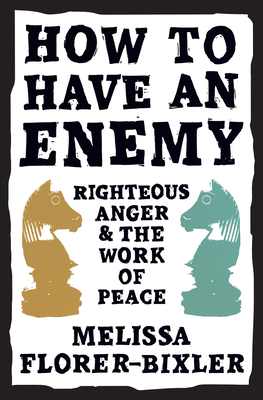How to Have an Enemy: Righteous Anger and the Work of Peace

How to Have an Enemy: Righteous Anger and the Work of Peace
Does Jesus' call to love our enemies mean that we should remain silent in the face of injustice?
Jesus called us to love our enemies. But to befriend an enemy, we first have to acknowledge their existence, understand who they are, and recognize the ways they are acting in opposition to God's good news. In How to Have an Enemy: Righteous Anger and the Work of Peace, Melissa Florer-Bixler looks closely at what the Bible says about enemies--who they are, what they do, and how Jesus and his followers responded to them. The result is a theology that allows us to name our enemies as a form of truth-telling about ourselves, our communities, and the histories in which our lives are embedded. Only then can we grapple with the power of the acts of destruction carried out by our enemies, and invite them to lay down their enmity, opening a path for healing, reconciliation, and unity.
Jesus named and confronted his enemies as an essential part to loving them. In this provocative book, Florer-Bixler calls us to do the same.
Does Jesus' call to love our enemies mean that we should remain silent in the face of injustice? Jesus called us to love our enemies. But to befriend an enemy, we first have to acknowledge their existence, understand who they are, and recognize the ways they are acting in opposition to God's good news. In How to Have an Enemy: Righteous Anger and the Work of Peace, Melissa Florer-Bixler looks closely at what the Bible says about enemies--who they are, what they do, and how Jesus and his followers responded to them. The result is a theology that allows us to name our enemies as a form of truth-telling about ourselves, our communities, and the histories in which our lives are embedded. Only then can we grapple with the power of the acts of destruction carried out by our enemies, and invite them to lay down their enmity, opening a path for healing, reconciliation, and unity.
Jesus named and confronted his enemies as an essential part to loving them. In this provocative book, Florer-Bixler calls us to do the same.
Does Jesus' call to love our enemies mean that we should remain silent in the face of injustice? Jesus called us to love our enemies. But to befriend an enemy, we first have to acknowledge their existence, understand who they are, and recognize the ways they are acting in opposition to God's good news. In How to Have an Enemy: Righteous Anger and the Work of Peace, Melissa Florer-Bixler looks closely at
PRP: 105.34 Lei
Acesta este Prețul Recomandat de Producător. Prețul de vânzare al produsului este afișat mai jos.
94.81Lei
94.81Lei
105.34 LeiLivrare in 2-4 saptamani
Descrierea produsului
Does Jesus' call to love our enemies mean that we should remain silent in the face of injustice?
Jesus called us to love our enemies. But to befriend an enemy, we first have to acknowledge their existence, understand who they are, and recognize the ways they are acting in opposition to God's good news. In How to Have an Enemy: Righteous Anger and the Work of Peace, Melissa Florer-Bixler looks closely at what the Bible says about enemies--who they are, what they do, and how Jesus and his followers responded to them. The result is a theology that allows us to name our enemies as a form of truth-telling about ourselves, our communities, and the histories in which our lives are embedded. Only then can we grapple with the power of the acts of destruction carried out by our enemies, and invite them to lay down their enmity, opening a path for healing, reconciliation, and unity.
Jesus named and confronted his enemies as an essential part to loving them. In this provocative book, Florer-Bixler calls us to do the same.
Does Jesus' call to love our enemies mean that we should remain silent in the face of injustice? Jesus called us to love our enemies. But to befriend an enemy, we first have to acknowledge their existence, understand who they are, and recognize the ways they are acting in opposition to God's good news. In How to Have an Enemy: Righteous Anger and the Work of Peace, Melissa Florer-Bixler looks closely at what the Bible says about enemies--who they are, what they do, and how Jesus and his followers responded to them. The result is a theology that allows us to name our enemies as a form of truth-telling about ourselves, our communities, and the histories in which our lives are embedded. Only then can we grapple with the power of the acts of destruction carried out by our enemies, and invite them to lay down their enmity, opening a path for healing, reconciliation, and unity.
Jesus named and confronted his enemies as an essential part to loving them. In this provocative book, Florer-Bixler calls us to do the same.
Does Jesus' call to love our enemies mean that we should remain silent in the face of injustice? Jesus called us to love our enemies. But to befriend an enemy, we first have to acknowledge their existence, understand who they are, and recognize the ways they are acting in opposition to God's good news. In How to Have an Enemy: Righteous Anger and the Work of Peace, Melissa Florer-Bixler looks closely at
Detaliile produsului










